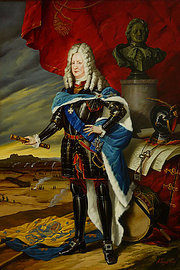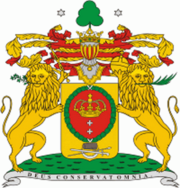- Boris Sheremetev
-
Boris Petrovich Sheremetev
Борис Петрович Шереметев
Born 25 April 1652
Moscow, Tsardom of RussiaDied 17 February 1719 (aged 66)
Moscow, Russian EmpireAllegiance Tsardom of Russia
Russian EmpireService/branch Imperial Russian Army Years of service 1681-1719 Rank Field Marshal Battles/wars Russo-Polish War (1654–67)
Russo-Turkish War (1686–1700)
Crimean campaigns
Azov campaigns
Great Northern War
Bulavin Rebellion
Prut CampaignAwards Titles:
Boyar (1686)
Count (1706)
Orders:
Order of St. AndrewBoris Petrovich Sheremetev (Russian: Бори́с Петро́вич Шереме́тев) (1652–1719) was created the first Russian count in 1706, and was also a diplomat and general field marshal during the Great Northern War. His children included Pyotr Sheremetev and Natalia Sheremeteva.
In his youth, Sheremetyev was a page to Tsar Alexis I before starting his military career. From 1671 he served at the imperial court. In 1681 he was a leader at Tambov, commanding the armies fighting the Crimean Khanate, and from 1682 he was a boyar. From 1685 to 1687 he participated in negotiations and the conclusion of the "Eternal Peace of 1686" with Poland and the allied treaty with Austria. From the end of 1687 he commanded the armies in Belgorod defending Russia's southern border, and participated in the Crimean campaigns.
After Peter I gained power in 1689, he joined him as a fellow campaigner. He participated along with Mazepa in the war against Turkey during the 1690s. During the Azov campaigns in 1695–96 he commanded armies on the Dnieper River in actions against the Crimean Tatars. In 1697–99 he carried out diplomatic assignments in Poland, Austria, Italy and Malta. In 1698, czar Peter sent a delegation to Malta under Sheremetyev to observe the training and abilities of the Knights of Malta and their fleet. Sheremetyev also investigated the possibility of future joint ventures with the Knights, including action against the Turks and the possibility of a future Russian naval base.[1]
Great Northern War
During the Great Northern War (1700–1721) Sheremetev proved to be a capable but cautious and sluggish military leader. During the war he was the commander-in-chief and most senior officer in the Russian army. Sheremetev was very cautious in his movements but proved more effective than the younger Prince Menshikov, the 2nd in command whose impulsiveness was not always successful.
In 1700 he joined the Russian army in its attack on Narva at the outbreak of the Great Northern War but was driven back from his position in Estonia by Charles XII of Sweden. He then became commander of the Russian forces fighting the Swedish armies in the Baltic provinces. Sheremetev was subsequently defeated by W. A. Schlippenbach at Rauge in 1701 but later prevailed at Erastfer. This victory won him the title of field marshal, and was followed up by another victory at the battle of Hummelshof in 1702. He then took the fortresses of Nöteborg and Nyenskans in 1703 (allowing the foundation of the city of Saint Petersburg) and the important Baltic cities Dorpat and Narva in 1704. In 1705 he was sent to Astrakhan, where he forcefully and successfully repressed the Astrakhan revolt.
Later in the Great Northern War, Sheremetev clashed with the Swedish general Lewenhaupt, who beat him at Gemäuerthof in 1705, and Charles XII, who defeated him at Holowczyn. His revenge came at the battle of Poltava, where he was the senior Russian commander and the Swedish army was soundly defeated by the Russian army. Armies under his command conquered Riga in 1710. He then led the main forces of the army in the Prut campaign. Fighting against Turkey in 1711, he suffered an encirclement at Prut. in 1715–17 he commanded armies in Pomorze and Mecklenburg.
Although sympathetic to Peter the Great's strivings to Westernise Russia, he never became close to the tsar. one of the etymologies of Sheremetev's surname is that of Tatar origin (shir Akhmat, "lion Ahmad"). He died in 1719 in Moscow and is buried in St. Petersburg.
References
Categories:- 1652 births
- 1719 deaths
- Field Marshals of Russia
- Russian nobility
- Knights of Malta
- Sheremetev family
- Recipients of the Order of the White Eagle (Poland)
- Recipients of the Order of St. Andrew
Wikimedia Foundation. 2010.


